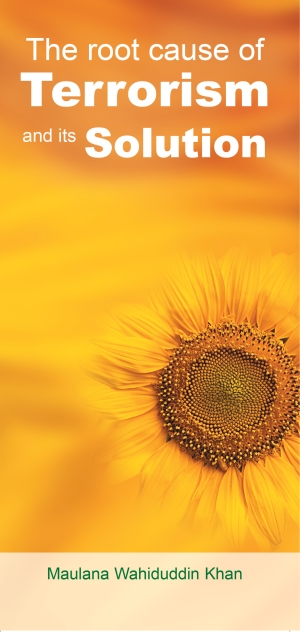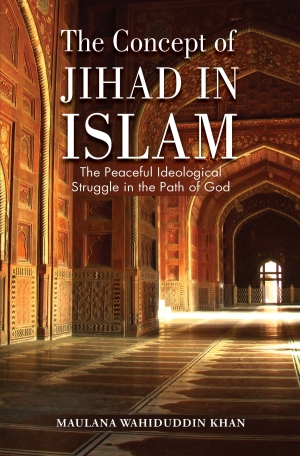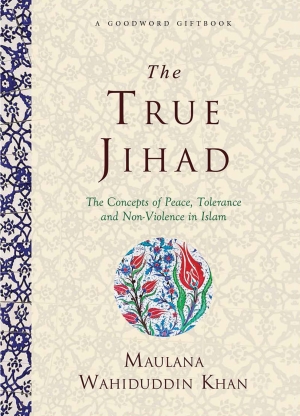Jihad means struggle. Any sincere effort for the cause of religion will be called Jihad. There is another kind of jihad called ‘qital’, that is, engaging in war at God’s behest at the time of aggression on the part of the enemies. The literal meaning of jihad is not war. However, fighting in self-defence according to God’s commandments also involves a struggle; it is also called jihad. In the sense of qital, this jihad is purely in self-defence to counter aggression, as mentioned in the Quran: “Permission to take up arms is hereby given to those who are attacked because they have been wronged” (22:38). In another place, the Quran gives a valid reason for fighting in self-defence: “They were the first to attack you” (9:13). It shows that according to the teachings of Islam, qital or war in self-defence is to be waged not against the enemy but the aggressor.
However, jihad, meaning war (qital), is a temporary and circumstantial matter. If any need for defence arises in the real sense, armed jihad will only be launched by an established state under stringent conditions. If no such severe urgency arises, no armed jihad will take place. Just calling an action ‘jihad’ will not morally validate it. The only true jihad is that which is carried out in accordance with Islam. Islamic jihad is, in fact, another name for peaceful struggle. This peaceful struggle is sometimes an inward-looking thing, like waging jihad with the self when it takes place at the level of feeling; sometimes, it is desired externally and manifests itself at the physical level through gestures (like kneeling, prostrating oneself before God) and sometimes to struggle to spread God’s word through the Quran.
Featured Articles
Featured Videos
FAQs
The Quran uses two different words: jihad and qital. Where the reference is to a peaceful struggle or exertion, the Quran uses the word jihad. For instance, the Quran (25: 52) refers to a peaceful jihad of inviting others to the faith through the Quran. And when the reference is to physical war, the Quran uses the word qital (as for instance, Quran 3: 121). But in the later period, after the demise of the Prophet, the word jihad began being often used as synonymous with qital, or war.
However, even if this usage of the term jihad is regarded as proper, still, it would be only an expanded usage of the term. In terms of the actual or essential meaning of the word, jihad is a term for a peaceful action, not a violent one. It is undertaken to enlighten people intellectually and spiritually; not to kill them.
Thus, Jihad if understood correctly is an entirely peaceful action. At the individual level, to engage in jihad is to refuse to deviate from the path of God despite the desires of one’s baser self and the difficult environment one confronts. It is to face the challenges that stand in one’s path and remain steadfast on the path of Truth. At the collective level, jihad can be called a peaceful struggle.
At the very basis of this struggle is an intellectual awakening among people, leading them to positive and constructive action and refining their character. Jihad, understood in this sense, inspires people to seek to become beneficial to others, and to be concerned about their welfare. The weapon deployed in true jihad is love, not hatred and violence.
Every word has both a literal as well as a conventional meaning—one that is related to how the word is conventionally used and understood. This is the case with the word ‘jihad’, too. The word ‘jihad’ comes from the root juhd or jahd. The literal connotation of this is exertion with much effort. The word ‘jihad’ is conventionally used for various sorts of exertion or struggle, one of which is war. However, it is used only for a particular and exceptional sort of war, one which is fought in the cause of God to end religious persecution. A war that is pursued for wealth and power will not be called a Jihad. The Quran says:
“Perform jihad with this most strenuously.” (Here 'this' refers to the Quran) (25: 52)
The Quran is not a sword or a gun. It is a book of ideology. In such a case, performing jihad with the Quran would mean an ideological struggle to convey the peaceful message of Islam to people. In the light of this verse of the Quran, jihad in actual fact is another name for peaceful activism or non-violent activism.
Source: Spirit of Islam October 2014
All skirmishes that we see in the life of the Prophet were in self-defence. None was done as offensive action directed against others. The Battle of the Trench happened in 627 AD. When the Prophet came to know that people were coming from Makkah to attack the Muslims of Madinah, he gathered all of his Companions and asked them how to deal with the situation in a non-confrontational manner. One of them, Salman Farsi who was from Persia, said that in Iran whenever kings have to avoid a battle, they dig a trench around their area. The Prophet liked this idea and all of the Muslims together dug a trench around Madinah. Madinah was covered from three sides: on one side there were dense date palm trees and on two sides there were mountains. So only one side of the city was exposed to entry, while three sides of the city had natural obstructions. On the exposed side, the Muslims dug a trench so that the army of the opponents could not reach Madinah. When the leader of Quraysh saw the trench, he exclaimed:
By God, this is a strategy which the Arabs know not of! (Sirah ibn Kathir, Vol. 3, p. 202)
The digging of the trench was a matter of strategy. A few skirmishes did take place at the time of the Battle of Khandaq when some people from the other side tried to get over the trench, but these were only one-to-one engagements.
Source: The Seeker’s Guide
Islam does give permission to do battle. But such permission is given only in the case of an attack by opponents in spite of the policy of avoidance being followed by the Muslims, thus creating a situation where self-defense becomes necessary. According to the teachings of Islam, war is to be waged not against the enemy but against the aggressor. If Muslims hold someone to be their enemy, that does not give them the right to attack him. The only right given to them is to convey the peaceful message of Islam to others. Islam permits defensive fighting against violent aggression, but only when all efforts at avoidance and reconciliation have failed. The Quran states:
“Permission to fight is granted to those who are attacked because they have been wronged. (22:39)
At another place the Quran enjoins the believers thus: “Fight in the cause of God against those who wage war against you but do not commit aggression. God does not love aggressors. (2:190)
A tradition narrates: “God grants to gentleness what He does not grant to harshness. (Sahih Muslim, Hadith No. 2593)
In the Quran God is referred to as: ‘the Source of Peace’. (Quran 59:23)
The practical example of the Prophet Muhammad provides incontrovertible proof of the value of this policy of avoidance and non-confrontation. He never lifted the sword in aggression or for territorial conquests. Only under extreme circumstances of defense did he allow defensive battles. Additionally, all the battles fought at that time were actually skirmishes and not wars as none of them lasted even for a day.
Source: The Seeker’s Guide
After a long and deep study of Islam, I came to know that in Islam, war is not the prerogative of the individual but of an established government. Only an established government can declare war. In other words, individuals can pray on their own, but they cannot wage wars of their own accord. Only when a war is declared by the ruling government, can the public join in and support it, and not before that. Islam does not sanction individual actions on this issue. Therefore no Non-Governmental Organization or NGO can declare war.
As a general principle, the Quran tells us that, even where an external attack is feared, the common man should not act independently, but should take the matter to the ruler, and then under his guidance take proper counter-measures. (4:83).
The Hadith also states that ‘the ruler is a shield, fighting is done under him, and security is attained through him.’
This clearly shows that the decision to do battle and its planning are the tasks of an established government. The common man can play his role as need be under government orders, and not independently.
This Islamic principle shows that there is no room for non-state warfare, which is what we generally call guerilla war. A guerilla war is fought by individual organizations, not by the State. As far as the state is concerned, if it wants to wage a defensive war against any country it has first—in obedience to the Quran—to issue a proper declaration. Only then can it wage a lawful war (8:58). In Islam, there is only ‘declared’ war. Therefore, in accordance with this principle, no proxy war in Islam can be lawful.
Most Islamic actions are governed by certain conditions. The waging of war is also thus subject to certain principles, one being that, even when a defensive war has been declared by the State, it will be aimed only at the combatants. Targeting non-combatants will be unlawful. The Quran enjoins us not to do battle with those who are not at war. Such people have to be dealt with kindly and equitably. But you are free to do battle with those who are fighting against you. (60:8-9)
If, for instance, a Muslim state is at war with a particular nation, and this war is in conformance with Islamic principles, it should still not permit any destructive activities against non-combatants (civilians), as was done on September 11, 2001, in New York and Washington. Similarly in Islamic war, Muslims are not permitted to commit suicidal bombings in order to destroy the enemy. Strapping explosives on to oneself and hurling oneself upon the civilian settlements of even those with whom one is at war, for the purpose of destroying the enemy, and in the process killing oneself deliberately, is totally un-Islamic.
Because of the importance of peace, the Quran has clearly declared that no aggressive war is permitted in Islam. Muslims can engage themselves only in a defensive, not in an offensive war, irrespective of the circumstances (2:190).
According to Islam, peace is the rule and war is only an exception. Even in defensive war we have to see the result. If the result is doubtful, Muslims should avoid war, even in a defensive situation. Stray acts of aggression are not enough for Muslims to rush into war. They have to assess the whole situation and adopt a policy of avoidance when war is not certain to achieve a positive result.
Source: The True Face of Islam










